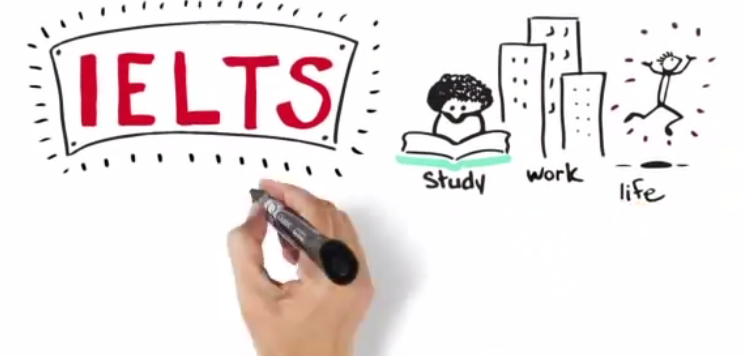(单词翻译:单击)
So you've decided to take the IELTS exam, good for you!It's the test for study, work, and life.
感谢选择报考雅思!无论是出于学习、工作或生活的目的,雅思考试都是你正确的选择。
The IELTS Speaking Test is divided into three sections.Part 1 is an introduction and general questions;
雅思口语考试分为三个部分。第一部分是自我介绍和回答一般性问题。
Part 2 is the long turn and Part 3 is an analytical discussion.Here we look at the criteria of Grammatical Range and Accuracy.
第二部分是个人陈述,第三部分是分析性的问答讨论。在这段视频中我们将介绍口语考试中“语法多样性及准确性”的评分标准。
Look for the other three criteria in other videos.This criteria focuses on the range and accuracy of the test-taker's grammar while speaking.
我们会在其他视频中分别介绍另外三项评分标准。语法多样性和准确性这一评分标准着重考查考生在口语表达时语法方面的多样性以及准确性。
Look for our accompanying downloads for examples of the range of grammatical structure.The range of grammar includes using a variety of complex structures.
请点击下载介绍各种语法结构示例的附件。语法多样性包括在表达过程中使用各种不同的复杂句型结构。
These are sentences with multiple bits of information.Contrast that to separate simple sentences with a single bits of information.
这些句子包含了多个信息点。这与多个独立的简单句型结构不同,简单句型只包含一个信息点。
For example, “Just beside the station was a stadium which was built in the 19th century and where games are now held every weekend.”
比如这个复杂句型:(车站旁边是一家建于十九世纪的体育场,如今每周末仍举办比赛。)
It isn't expected the candidates are one hundred percent accurate, however, control is important.
评分标准并不要求考生达到语法百分之百的准确,但是,对准确性的控制十分重要。
The band 7 definition for grammatical range and accuracy says: frequently produces error-free sentences, though was some grammatical mistakes persist.
雅思考试在“语法多样性与准确性”一项中7分的评分标准是:虽然出现一些语法错误,但语句通常正确。
It's not just the number of grammatical mistakes, but also how seriously these mistakes block communication.
准确性不仅体现在语法错误出现的次数,还体现在这些语法错误在多大程度上造成了沟通理解障碍。
To improve your grammar, take these steps.
我们建议你采取以下步骤提升你的语法得分。
Be prepared, make sure that you know the speaking test format and what type of questions to expect in each section.
首先,进行充分的准备。一定要熟悉雅思口语考试的形式,了解每一部分会出现什么类型的问题。
Many tasks in Part 2 of the IELTS speaking test relate to the past, so you most likely use past tenses.
雅思口语考试第二部分中,许多题目内容都与过去发生的事情有关,因此你极可能需要使用过去时态。
Insure you know the past tenses of common verbs.
一定要熟悉常用动词的过去式和过去分词。
Some questions in part 3 ask you to speculate about the future, so use the right tenses in the answers to reflect this.
第三部分中有些问题需要你就未来将会发生的事情进行推测,因此在你的回答中则需要使用相应的时态。
Look out for the British Council's Johnnie Grammar apps and videos that can help explain the commonly used tenses for you.
英国文化协会推出了名为“Johnny Grammar”的应用和视频,向你详细介绍常用的各种时态。
Practice. Particularly think about the tenses you use, insure these relate to the questions.
此外,不断练习,特别是要顾及你所使用的时态。要把时态的使用与问题的内容联系起来。

If the question asked is "What did you do at work today?" the main word here is "did", which is in the past tense, so your answers should be in the past tense, too.
如果问题是What did you do it work today?(你今天上班都做了什么?),关键词是 did,也就是过去时,那么你的回答也应该使用过去时。
For example, "Today I wrote a business brief."Don't worry if you realize you've made a mistake, it's okay to correct yourself.
例如 Today I wrote a business brief.(今天我写了一份商业简报。)当你意识到自己出现了语法错误,没关系,你可以即时更正。
Record yourself speaking and listen to identify errors.
把自己的口语练习录下来,然后重放寻找语法错误。
IELTS results range from band scores of 1 to 9, however there are not specific questions for different bands scores,
雅思考试的成绩为1至9分,但并没有针对不同分数而采用不同的题目。
and there can't be as the score isn't assigned until the end of the speaking test.
考官将在整个口语考试结束后,对考生的口语水平进行评分。
Also remember there are no quotas for IELTS band scores.Each individual is scored on their own merits.
另外,雅思考试对各个分数并没有所谓的“配额”。每位考生的成绩都是因其个人水平而评定的。
For more information, please see the other speaking test videos: fluency and coherence, lexical resource and accuracy, and pronunciation.
请点击观看其他的雅思口语考试备考短片了解其他三个评分标准:流利性与连贯性、词汇多样性及准确性以及发音。


